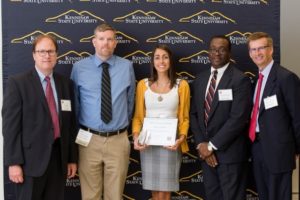Birla Carbon 2017 Scholars Program at Kennesaw State University
enters its fourth year
enters its fourth year
Birla Carbon and Kennesaw State University (KSU) marked the completion of its fourth year of a unique partnership, when 10 students were recognised and awarded the Birla Carbon scholarship and a stipend by the KSU College of Science and Mathematics. The presentation took place on August 29, 2017 at a KSU symposium.
 The scholarship program is designed to provide 10 KSU students with US$4,000 stipends for summer research in science and mathematics. Each student scholar works along with a faculty researcher on a project, which deals with various topics revolving around sustainability, an aspect that Birla Carbon strongly practices and advocates.
The scholarship program is designed to provide 10 KSU students with US$4,000 stipends for summer research in science and mathematics. Each student scholar works along with a faculty researcher on a project, which deals with various topics revolving around sustainability, an aspect that Birla Carbon strongly practices and advocates.
Dale Clark, Chief Technology Officer, Birla Carbon, who is on the student reviewing panel for the scholarship said, “Learning is a never ending process and we are happy to see such young talent that is so keen on learning and immensely passionate about their research. It is because of the unwavering efforts of these students that the partnership between Birla Carbon and KSU has reached such great heights and we hope to see it strengthen in the future as well.”
The scholars program was developed in April 2014 with a $250,000 pledge from Birla Carbon for a five-year annual gift of $50,000 to support research opportunities for students in Kennesaw State’s College of Science and Mathematics. The program has awarded 40 Kennesaw State students each a $4,000 stipend since 2014. This event marked the fourth year of a five-year partnership with Birla Carbon, which has allowed the College’s 10 Birla Carbon Scholars to participate in summer research opportunities. Four Kennesaw State graduates are currently working at the Birla Carbon’s Marietta Technology Center.
Rebecca Webster, a senior at the KSU, won the Top Poster Award, for her research project on the parasitic Harper’s Dodder (Cuscuta harperi) plant’s ability to select certain plant hosts based on smell. Along with the $4,000 stipend, she received an additional $2,000 in travel funds to present her research at a national or regional conference of her choice.
In addition to the scholars program, funds from the Birla Carbon gift will be used to provide research supplies needed for faculty assisting students and supplies needed for the end-of-the-term symposium.









